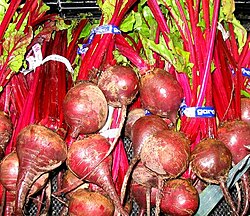beet
Hello, you have come here looking for the meaning of the word beet. In DICTIOUS you will not only get to know all the dictionary meanings for the word beet, but we will also tell you about its etymology, its characteristics and you will know how to say beet in singular and plural. Everything you need to know about the word beet you have here. The definition of the word beet will help you to be more precise and correct when speaking or writing your texts. Knowing the definition ofbeet, as well as those of other words, enriches your vocabulary and provides you with more and better linguistic resources.

A pile of beets.
English
Pronunciation
Etymology 1

From Middle English bete, from Old English bēte, from Latin bēta, possibly of Celtic origin.
Noun
beet (countable and uncountable, plural beets)
- Beta vulgaris, a plant with a swollen root which is eaten or used to make sugar.
- The beet is a hardy species.
- (US, Canada) A beetroot; a swollen root of such a plant used as a culinary vegetable.
- 1961, Harry E. Wedeck, Dictionary of Aphrodisiacs, New York: The Citadel Press, page 42:
- In general, beets, carrots, and turnips are all of aphrodisiac value in erotic dietary.
- 2023 December 5, Ella Quittner, “How WFH Helped Make Sacramento a Great Restaurant City”, in The New York Times, New York, N.Y.: The New York Times Company, →ISSN, →OCLC, archived from the original on 5 December 2023:
- In the past several years, Moonbelly and Faria, two bakeries whose flaky croissants and elegant loaves rival those at Du Pain et des Idées in Paris, have opened, with rotating offerings of buckwheat coffee cake, roasted bok choy-milk bread buns and focaccia sandwiches stuffed with beet and feta sold under the moniker “girl dinner.”
Usage notes
Unlike beetroot, beet is usually countable when referring to the food: pickled beets (but pickled beetroot).
Hyponyms
Derived terms
Descendants
- → Chickasaw: (from the plural) biits
- → Hawaiian: piki
- → Japanese: ビート (beet)
- → Korean: 비트 (biteu)
- → Maori: pīti
Translations
Beta vulgaris — see also chard
|
a root
See also
References
 beet on Wikipedia.Wikipedia
beet on Wikipedia.Wikipedia  Category:beets on Wikimedia Commons.Wikimedia Commons
Category:beets on Wikimedia Commons.Wikimedia Commons  Beta vulgaris on Wikispecies.Wikispecies
Beta vulgaris on Wikispecies.Wikispecies  Category:Beta on Wikimedia Commons.Wikimedia Commons
Category:Beta on Wikimedia Commons.Wikimedia Commons - beet at University of Melbourne "Sorting plant names"
Etymology 2
From Middle English beten, from Old English bētan.
Alternative forms
Verb
beet
- (transitive, obsolete, dialect) To improve; to mend.
- (transitive, obsolete, dialect) To kindle a fire.
- (transitive, obsolete, dialect) To rouse.
Anagrams
Afrikaans
Etymology
From Dutch beet, variant of biet, from Middle Dutch bete, from Latin bēta.
Pronunciation
Noun
beet (plural bete)
References
- 2007. The UCLA Phonetics Lab Archive. Los Angeles, CA: UCLA Department of Linguistics.
Dutch
Pronunciation
Etymology 1
From Middle Dutch bēte, from Old Dutch *biti, from Proto-Germanic *bitiz.
Noun
beet m (plural beten, diminutive beetje n)
Derived terms
Related terms
Descendants
- Negerhollands: bit
Etymology 2
From Middle Dutch bete, from Latin bēta.
Noun
beet f (plural beten, diminutive beetje n)
- alternative form of biet
Derived terms
Etymology 3
See the etymology of the corresponding lemma form.
Verb
beet
Anagrams
Finnish
Noun
beet
- nominative plural of bee
Latin
Verb
beet
Middle English
Noun
beet
- alternative form of bete
Norman
Alternative forms
- baête (continental)
- bête (Jersey, Guernsey)
Etymology
From Old French beste, from Latin bēstia.
Noun
beet f (plural beets)